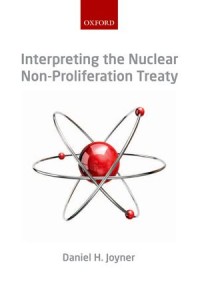Let me respond to Kevin’s thoughtful post and discuss an opportunity for judicial review of an (implicit or explicit) elected branch assertion of the existence of an armed conflict. (After all, I promised Raha an example that I have not yet provided.)
In my opinion, Hamdan is not an example of such judicial review. The Bush administration did not argue that no armed conflict existed between the U.S. and al Qaeda. It argued that it was an armed conflict unregulated by the Geneva Conventions of 1949 (or other law delimiting the President’s use of war-like powers). In the language Kevin quotes, the Court rejected that claim. The dispute wasn’t about whether an armed conflict existed, only about what law governed it.
The review of military commissions proceedings should provide an opportunity for judicial review of the existence of an armed conflict contrary to elected branch claims. This is because military commissions are part and parcel of the war powers of our government, and the existence of an armed conflict would seem to be essential to their use. According to In re Yamashita, 321 U.S. 1, 11-12 (1946),
“The trial and punishment of enemy combatants who have committed violations of the law of war is thus not only a part of the conduct of war operating as a preventive measure against such violations, but is an exercise of the authority sanctioned by Congress to administer the system of military justice recognized by the law of war. That sanction is without qualification as to the exercise of this authority so long as a state of war exists — from its declaration until peace is proclaimed.” (emphasis added)
Thus, there is a very good argument that military commissions do not have constitutional power to try individuals for any conduct engaged in prior to the existence of an armed conflict. Such conduct cannot be a law of war violation, nor would its punishment prevent violations of the laws of war or be a “part of the conduct of war.” This remains true even if one accepts that commissions are now being convened during an armed conflict. In this way, military commissions are similar to courts-martial, which require that an individual be subject to the Uniform Code of Military Justice at the time of the offense (for subject matter jurisdiction) and at the time of trial (for personal jurisdiction). Conduct underlying an alleged military commission offense occurring prior to an armed conflict is not within the subject matter jurisdiction of military commissions. Yet some military commission charges are for conduct, such as the USS Cole attack, which predates September 11, 2001 (9/11).
The issue then becomes whether an armed conflict with al Qaeda existed prior to 9/11. The Military Commissions Act authorizes prosecution of offenses it defines regardless of whether the underlying conduct occurred “before, on or after September 11, 2001.” 10 U.S.C. 948d. This might be interpreted as a legislative assertion that an armed conflict existed prior to 9/11, or as a delegation to the executive to determine that it did at the time of any offense charged. Thus, in spite of what the plurality appeared to suggest in Hamdan, merely charging pre-9/11 conduct should at the very least be understood as an implicit assertion of the existence of an armed conflict on the inclusive dates of the offense(s).
In Hamdan, although the issue was raised, the Supreme Court never determined when the armed conflict with al Qaeda began. The basis of the Court’s decision made it unnecessary to resolve the issue, although Hamdan had been charged with conspiratorial conduct dating back to 1996. In his dissenting opinion, Justice Thomas found “that the duration of that conflict dates back (at least) to Usama bin Laden’s August 1996 Declaration of Jihad Against the Americans.” The plurality disagreed, remarking “even the government does not go so far.” It noted, “neither in the charging document nor in submissions before this Court has the Government asserted that the President’s war powers were activated prior to September 11, 2001.”
So just when did the armed conflict with al Qaeda begin?
After bin Laden’s declaration of “war,” I believe al Qaeda’s first significant acts of violence were the 1998 bombings of U.S. embassies in Africa. President Clinton unilaterally responded with missile attacks in Sudan and Afghanistan. In a statement to the Nation, he stated that the attacks were part of “a long, ongoing struggle between freedom and fanaticism.” He said that there was “compelling information [al Qaeda members] were planning additional terrorist attacks against our citizens and others with the inevitable collateral casualties and … seeking to acquire chemical weapons and other dangerous weapons.”
Were the embassy bombings “armed attacks,” “acts of hostilities” or merely peacetime crimes of violence? What about the military response? Clinton’s remarks and military response could be taken as identifying, engaging and seeking to terminate an armed conflict. It is has been reported that the Justice Department’s Office of Legal Counsel (OLC) issued an opinion in which it found the U.S. to be in an “armed conflict” with al Qaeda in 1998. On the other hand, the U.S. has prosecuted alleged participants in the bombings in a federal, not a military court. Given the very indistinct nature of the executive’s response and the lack of any action by Congress, it would be difficult to find these bombings and the U.S. response anything more than limited incidents of hostilities, rather than the start or continuation of an armed conflict that persisted until 9/11.
The next significant act of violence against the U.S. attributed to al Qaeda was the bombing of the USS Cole in a Yemeni port. I am unaware of any reported U.S. military response to this attack. Around the same time, a U.S. intelligence official stated, “[w]e have quietly gone after [bin Laden’s] organization, and we’re picking it apart limb by limb.” The actual nature and scope of any covert operations in response to this incident, or in response to the embassy bombings, is not fully known. Given the fact that covert actions are not supposed to involve “traditional military activities,” it might be hard to classify them as acts of hostilities forming part of an armed conflict, but they could be. The FBI investigated and the U.S later issued federal indictments (not military charges) against suspects allegedly associated with al Qaeda.
This history suggests, similar to the facts in Monotoya (cited in my earlier post), that the political branches gave no clear indication that the U.S. was in a general state of armed conflict or actual hostilities with al Qaeda prior to 9/11. Such a finding would be difficult given the intermittent nature of al Qaeda violence and the somewhat schizophrenic nature of U.S. responses to it. A court reviewing the jurisdiction of military commissions might reasonably conclude that the embassy bombings and the U.S. military response are incidents of “actual hostilities” or armed conflict given the scale of the attack and the military response. The OLC memo apparently supports this view, perhaps more. It is possible the extent of U.S. covert operations against al Qaeda could be considered enough to perpetuate the state of hostilities if the government is willing to reveal them to support its jurisdictional claims. It is certainly an interesting problem, but one that a court reviewing the jurisdictional limits of military commissions would seem to have an independent say in resolving.


 Print This Page
Print This Page



